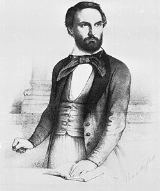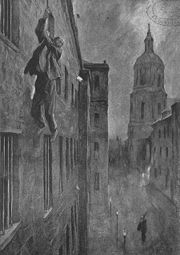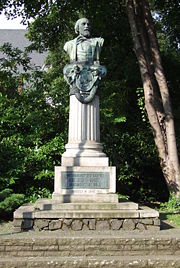
Gottfried Kinkel
Encyclopedia
Johann Gottfried Kinkel (August 11, 1815 - November 13, 1882) was a German
poet
also noted for his revolutionary activities and his escape from a Prussian prison in Spandau
with the help of his friend Carl Schurz
.
(now part of Bonn
). Having studied theology
at Bonn and Berlin
, he established himself at Bonn in 1836 as a Privatdozent
, or theology tutor, became master at the secondary school there, and was for a short time assistant preacher in Cologne
.
Changing his religious opinions, he abandoned theology and delivered lectures on the history of art, in which he had become interested on a journey to Italy
in 1837. In 1843, he married Johanna Mockel
(1810–1858), a writer, composer and musician who assisted her husband in his literary work and revolutionary activities. They had four children. In 1846 he was appointed extraordinary professor of the history of art at the University of Bonn
.
, he started a newspaper, the Bonner Zeitung, mostly devoted to following revolutionary activities, but also providing the traditional material such as musical and theatrical reviews that people expected then from a full-service newspaper.
Kinkel joined the armed rebellion in the Palatinate in 1849, believing himself to be acting legally in obedience to the directives of the Frankfurt Parliament
. In a battle he was wounded and arrested and later sentenced to life imprisonment. Although the authorities originally sentenced him to be incarcerated in a fortress where he would have been able to pursue some semblance of his professional activities, Friedrich Wilhelm IV of Prussia found this sentence to be illegal since he was not sentenced to death and “graciously” commuted it to lifetime imprisonment in a reformatory where his head was shaved, and he had to wear prisoner's garb and spend his time spinning wool. He was eventually transferred to Spandau
in Berlin, where his friend and former student Carl Schurz helped him escape the prison at Spandau and reach London, England in November 1850. In London, he joined the Communist League. Later he became involved with the August Willich
-Karl Schapper
group within the League and came out against Karl Marx
and Frederick Engels in the split within the Communist League.
 Kinkel went to the United States
Kinkel went to the United States
to raise funds for a “German National Loan” that was to fund revolutionary activities in Germany. Although he was enthusiastically received, and met with President Millard Filmore, he raised very little money. Returning to London
in 1853, he taught German
and public speaking for women, and lectured on German literature
, art, and the history of culture. In 1858, he founded the German paper, Hermann. In 1860, he married Minna Emilia Ida Werner, a Königsberg
er who was living in London. In 1863, he was appointed examiner at the University of London and other schools in England.
, where he died 16 years later. He was never able to return to Germany. The 1920 Encyclopedia Americana
speculates that it was probably his love of his native country that brought him to Zürich.
 In the estimation of 1911 Encyclopædia Britannica, Kinkel's popularity was out of proportion to his talent; his poetry is of the sweetly sentimental type in vogue in Germany in the mid-19th century.
In the estimation of 1911 Encyclopædia Britannica, Kinkel's popularity was out of proportion to his talent; his poetry is of the sweetly sentimental type in vogue in Germany in the mid-19th century.
His Gedichte first appeared in 1843, and went through several editions. His best works were the verse romances, Otto der Schütz, eine rheinische Geschichte in zwölf Abenteuern (1846), which by 1920 had gone through over 100 editions, and Der Grobschmied von Antwerpen (1868). Among his other works were the tragedy
Nimrod (1857), and Geschichte der bildenden Künste bei den christichen Völkern (A history of visual arts among Christians, 1845), Die Ahr
: Landschaft, Geschichte und Volksleben (Landscape, history and life of the people along the Ahr, 1845), and Mosaik zur Kunstgeschichte (1876).
Germany
Germany , officially the Federal Republic of Germany , is a federal parliamentary republic in Europe. The country consists of 16 states while the capital and largest city is Berlin. Germany covers an area of 357,021 km2 and has a largely temperate seasonal climate...
poet
Poet
A poet is a person who writes poetry. A poet's work can be literal, meaning that his work is derived from a specific event, or metaphorical, meaning that his work can take on many meanings and forms. Poets have existed since antiquity, in nearly all languages, and have produced works that vary...
also noted for his revolutionary activities and his escape from a Prussian prison in Spandau
Spandau
Spandau is the fifth of the twelve boroughs of Berlin. It is the fourth largest and westernmost borough, situated at the confluence of the Havel and Spree rivers and along the western bank of the Havel, but the least populated.-Overview:...
with the help of his friend Carl Schurz
Carl Schurz
Carl Christian Schurz was a German revolutionary, American statesman and reformer, and Union Army General in the American Civil War. He was also an accomplished journalist, newspaper editor and orator, who in 1869 became the first German-born American elected to the United States Senate.His wife,...
.
Early life
He was born at OberkasselOberkassel (Bonn)
Oberkassel is a suburb in the Bonn municipal district of Beuel and lies on the right bank of the Rhine on the edge of the Siebengebirge mountains. Oberkassel has about 7,200 inhabitants.-History :...
(now part of Bonn
Bonn
Bonn is the 19th largest city in Germany. Located in the Cologne/Bonn Region, about 25 kilometres south of Cologne on the river Rhine in the State of North Rhine-Westphalia, it was the capital of West Germany from 1949 to 1990 and the official seat of government of united Germany from 1990 to 1999....
). Having studied theology
Theology
Theology is the systematic and rational study of religion and its influences and of the nature of religious truths, or the learned profession acquired by completing specialized training in religious studies, usually at a university or school of divinity or seminary.-Definition:Augustine of Hippo...
at Bonn and Berlin
Berlin
Berlin is the capital city of Germany and is one of the 16 states of Germany. With a population of 3.45 million people, Berlin is Germany's largest city. It is the second most populous city proper and the seventh most populous urban area in the European Union...
, he established himself at Bonn in 1836 as a Privatdozent
Privatdozent
Privatdozent or Private lecturer is a title conferred in some European university systems, especially in German-speaking countries, for someone who pursues an academic career and holds all formal qualifications to become a tenured university professor...
, or theology tutor, became master at the secondary school there, and was for a short time assistant preacher in Cologne
Cologne
Cologne is Germany's fourth-largest city , and is the largest city both in the Germany Federal State of North Rhine-Westphalia and within the Rhine-Ruhr Metropolitan Area, one of the major European metropolitan areas with more than ten million inhabitants.Cologne is located on both sides of the...
.
Changing his religious opinions, he abandoned theology and delivered lectures on the history of art, in which he had become interested on a journey to Italy
Italy
Italy , officially the Italian Republic languages]] under the European Charter for Regional or Minority Languages. In each of these, Italy's official name is as follows:;;;;;;;;), is a unitary parliamentary republic in South-Central Europe. To the north it borders France, Switzerland, Austria and...
in 1837. In 1843, he married Johanna Mockel
Johanna Kinkel
Johanna Kinkel was a German composer, writer, and revolutionary.Kinkel was born in Bonn. In 1840, after five months of unhappy marriage, she was divorced from the Cologne bookseller Matthieux. Her second marriage, in 1843, was to the German poet Gottfried Kinkel. They had four children...
(1810–1858), a writer, composer and musician who assisted her husband in his literary work and revolutionary activities. They had four children. In 1846 he was appointed extraordinary professor of the history of art at the University of Bonn
University of Bonn
The University of Bonn is a public research university located in Bonn, Germany. Founded in its present form in 1818, as the linear successor of earlier academic institutions, the University of Bonn is today one of the leading universities in Germany. The University of Bonn offers a large number...
.
Revolutionary
In 1848, with his wife and Carl SchurzCarl Schurz
Carl Christian Schurz was a German revolutionary, American statesman and reformer, and Union Army General in the American Civil War. He was also an accomplished journalist, newspaper editor and orator, who in 1869 became the first German-born American elected to the United States Senate.His wife,...
, he started a newspaper, the Bonner Zeitung, mostly devoted to following revolutionary activities, but also providing the traditional material such as musical and theatrical reviews that people expected then from a full-service newspaper.
Kinkel joined the armed rebellion in the Palatinate in 1849, believing himself to be acting legally in obedience to the directives of the Frankfurt Parliament
Frankfurt Parliament
The Frankfurt Assembly was the first freely elected parliament for all of Germany. Session was held from May 18, 1848 to May 31, 1849 in the Paulskirche at Frankfurt am Main...
. In a battle he was wounded and arrested and later sentenced to life imprisonment. Although the authorities originally sentenced him to be incarcerated in a fortress where he would have been able to pursue some semblance of his professional activities, Friedrich Wilhelm IV of Prussia found this sentence to be illegal since he was not sentenced to death and “graciously” commuted it to lifetime imprisonment in a reformatory where his head was shaved, and he had to wear prisoner's garb and spend his time spinning wool. He was eventually transferred to Spandau
Spandau (locality)
Spandau is a locality of Berlin in the homonymous borough of Spandau. The historic city is situated, for the most part, on the western banks of the Havel river. As of 2008 the estimated population of Spandau was 33,433.-Position:...
in Berlin, where his friend and former student Carl Schurz helped him escape the prison at Spandau and reach London, England in November 1850. In London, he joined the Communist League. Later he became involved with the August Willich
August Willich
August Willich , born Johann August Ernst von Willich, was a military officer in the Prussian Army and a leading early proponent of Communism in Germany. In 1847 he discarded his title of nobility...
-Karl Schapper
Karl Schapper
Karl Schapper was a German socialist and labour leader. He was one of the pioneers of the labour movement in Germany and an early associate of Wilhelm Weitling and Karl Marx.-Young Germany and Mazzini:...
group within the League and came out against Karl Marx
Karl Marx
Karl Heinrich Marx was a German philosopher, economist, sociologist, historian, journalist, and revolutionary socialist. His ideas played a significant role in the development of social science and the socialist political movement...
and Frederick Engels in the split within the Communist League.

United States
The United States of America is a federal constitutional republic comprising fifty states and a federal district...
to raise funds for a “German National Loan” that was to fund revolutionary activities in Germany. Although he was enthusiastically received, and met with President Millard Filmore, he raised very little money. Returning to London
London
London is the capital city of :England and the :United Kingdom, the largest metropolitan area in the United Kingdom, and the largest urban zone in the European Union by most measures. Located on the River Thames, London has been a major settlement for two millennia, its history going back to its...
in 1853, he taught German
German language
German is a West Germanic language, related to and classified alongside English and Dutch. With an estimated 90 – 98 million native speakers, German is one of the world's major languages and is the most widely-spoken first language in the European Union....
and public speaking for women, and lectured on German literature
German literature
German literature comprises those literary texts written in the German language. This includes literature written in Germany, Austria, the German part of Switzerland, and to a lesser extent works of the German diaspora. German literature of the modern period is mostly in Standard German, but there...
, art, and the history of culture. In 1858, he founded the German paper, Hermann. In 1860, he married Minna Emilia Ida Werner, a Königsberg
Königsberg
Königsberg was the capital of East Prussia from the Late Middle Ages until 1945 as well as the northernmost and easternmost German city with 286,666 inhabitants . Due to the multicultural society in and around the city, there are several local names for it...
er who was living in London. In 1863, he was appointed examiner at the University of London and other schools in England.
Death
In 1866 he accepted a professorship of archaeology and the history of art at the Polytechnikum in ZürichZürich
Zurich is the largest city in Switzerland and the capital of the canton of Zurich. It is located in central Switzerland at the northwestern tip of Lake Zurich...
, where he died 16 years later. He was never able to return to Germany. The 1920 Encyclopedia Americana
Encyclopedia Americana
Encyclopedia Americana is one of the largest general encyclopedias in the English language. Following the acquisition of Grolier in 2000, the encyclopedia has been produced by Scholastic....
speculates that it was probably his love of his native country that brought him to Zürich.
Writings

His Gedichte first appeared in 1843, and went through several editions. His best works were the verse romances, Otto der Schütz, eine rheinische Geschichte in zwölf Abenteuern (1846), which by 1920 had gone through over 100 editions, and Der Grobschmied von Antwerpen (1868). Among his other works were the tragedy
Tragedy
Tragedy is a form of art based on human suffering that offers its audience pleasure. While most cultures have developed forms that provoke this paradoxical response, tragedy refers to a specific tradition of drama that has played a unique and important role historically in the self-definition of...
Nimrod (1857), and Geschichte der bildenden Künste bei den christichen Völkern (A history of visual arts among Christians, 1845), Die Ahr
Ahr
Ahr is a river in Germany, a left tributary of the Rhine. Its source is at an elevation of approximately 470 metres above sea level in Blankenheim in the Eifel, in the cellar of a timber-frame house near the castle of Blankenheim...
: Landschaft, Geschichte und Volksleben (Landscape, history and life of the people along the Ahr, 1845), and Mosaik zur Kunstgeschichte (1876).
Media
Kinkel's escape from Spandau is briefly dramatized in the third part (“Little Germanies”) of Engstfeld Film's four-part series Germans in America (2006).Further reading
This work in turn cites:-
- A. StrodtmannAdolf StrodtmannAdolf Heinrich Strodtmann was a German poet, journalist, translator and literary historian. He wrote an early biography of Heinrich Heine and emigrated to the United States for a time.-Biography:...
, Gottfried Kinkel (2 vols., Hamburg, 1851). - Otto Henne am RhynOtto Henne am RhynOtto Henne am Rhyn was an Swiss writer. He was a son of Josef Anton Henne called "von Sargans". After marrying Elisabeth am Rhyn, a member of the important Lucerne family am Rhyn, he added her name to his own family name. After studying philosophy and history in Bern and Geneva, he became a...
, G. Kinkel, ein Lebensbild (Zürich, 1883).
- A. Strodtmann
- Carl SchurzCarl SchurzCarl Christian Schurz was a German revolutionary, American statesman and reformer, and Union Army General in the American Civil War. He was also an accomplished journalist, newspaper editor and orator, who in 1869 became the first German-born American elected to the United States Senate.His wife,...
, (3 vols., New York: McClure Publ. Co., 1907). Volume One has a detailed description of Kinkel's revolutionary activities in Bonn and his subsequent trial, imprisonment and escape from the Prussian authorities. His life in exile is also discussed in some detail up to 1852 when Schurz left Kinkel and England to emigrate to the United States.

